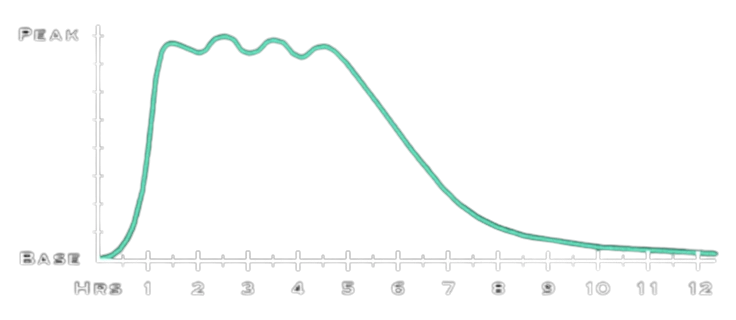The history of LSD therapy
LSD is a synthetic drug that was first synthesized in 1938 by Swiss chemist Albert Hofmann. In the 1950s and 1960s it was experimented by the CIA as a potential truth serum and mind control agent. LSD therapy was possible in the 1960s and then became illegal fairly quickly. During the 1960s, LSD became popular among youth and hippies for its hallucinogenic and mind-altering effects. Because of this, LSD was quickly banned in the United States and most other countries due to its potentially harmful effects on the brain and psyche, as well as growing concerns about recreational use and abuse. Over the past ten years, research has again been permitted and frequently conducted. The potential as a therapeutic support of LSD is high.
Legal LSD therapy
In the Netherlands it is possible to offer legal LSD therapy by using LSD analogues, which are substances that are structurally and functionally similar to illegal LSD. This LSD analogue works the same as LSD-25 after ingestion, but is not listed in the Dutch Opium Act as an illegal substance. Because LSD is not yet classified as a drug, it is one according to current legislation LSD session so no official treatment that replaces regular mental health therapy. Yet, through legal analogues and imitating future LSD therapy, we can already offer a comparable alternative.
How LSD works
LSD affects your brain and your perception. The first effects of LSD begin about 30 minutes after ingestion, and the peak of effects occurs on average after 75 minutes. These effects can be divided into what you experience and what is measurable in the brain. The total duration of an LSD trip averages 8 hours with an afterglow of approximately 4 hours.

LSD in science
In recent years, more research has been conducted into LSD and the added value of LSD during therapy. LSD therapy works well through several mechanisms of action. One of them is that LSD increases the activity of the amygdala, a brain region involved in fear and emotion regulation, decreases. This can lead to a decrease in negative emotions and an increase in positive emotions. Another explanation is that LSD is the connectivity changes between different brain areas, allowing new perspectives, insights or meanings to arise. This can help to break through ingrained thought patterns or beliefs and to process traumatic experiences. A third explanation is that LSD is the neuroplasticity, promotes the brain's ability to adapt and change. This can lead to an improvement in learning ability, memory and mood. Because of these mechanisms, research is being conducted into the effect of LSD on the following complaints and/or conditions
Depression
Several studies on the use of LSD for depression have been conducted, although most took place in the 1960s and 1970s and were often unstructured or uncontrolled. However, a recent interest has led to controlled studies that have shown several promising results.
For example, in 2014 a small, placebo-controlled study showed that one dose of LSD temporarily improved mood in patients with depression. Also, another study in 2020 found that in combination with psychotherapy, LSD reduced symptoms of depression and anxiety in patients with a life-threatening illness.
Fear
2021 Study: From research to treatment: LSD-assisted psychotherapy with existential anxiety.
This study investigated whether the psychedelic substance LSD can be effective as a treatment in patients who have anxiety and mood disorders in the last phase of their lives.
2019 Study: Assessing the Potential of LSD-Assisted Therapy for the Treatment of Anxiety
This study examined the potential of LSD-assisted therapy as a treatment for anxiety disorders. Positive results were found and it was suggested that further research is needed.
2016 study: The effects of LSD-assisted psychotherapy in patients with anxiety disorders
This study examined the effects of LSD-assisted psychotherapy in patients with anxiety disorders. Positive results were found and it was concluded that further research is needed.
Addiction
Several studies have been conducted on the possible effects of LSD on addiction. One of these is a study from Great Britain, in which twenty volunteers with depression or addiction were given LSD and monitored with brain scanners. The researchers found that LSD was the default mode network (DMN), a network of brain regions involved in self-reflection and identity, temporarily disabled. This could lead to a reduction in negative thoughts, an increase in awareness and a change in perspective. Another study is a meta-analysis of six studies from the 1960s in which 536 patients with alcoholism were given LSD as part of their treatment. The meta-analysis found that LSD had a significant positive impact on reducing alcohol abuse up to six months after treatment. The researchers suggested that LSD is a spiritual or mystical experience that can lead to a change in values, goals and priorities.
Overview
In addition to the aforementioned studies into LSD for depression, anxiety and addiction, there are also ongoing studies into: PTSD, OCD, personality disorders, Autism Spectrum Disorder (ASD), Cluster headaches, Chronic pain, Alzheimer's, Parkinson's, MS and more. Via the button below.
LSD session at Triptherapy
Trip therapy has included the LSD session in its psychedelic services since 2019. Although most customers opt for psilocybin therapy, the demand for LSD therapy is growing due to media attention and the positive research results achieved in clinical trials. About 80% of our customers choose a psilocybin session, 15% for MDMA therapy and 5% for LSD therapy. This seems relatively small, but amounts to 1 in 20 people.
An advantage and disadvantage of LSD sessions is the long duration of action of LSD, which means that we often advise against LSD for people who have never used psychedelics. This is because if people would experience the psychedelic state as unpleasant, LSD would be unpleasant for too long. We often recommend that inexperienced people first try a shorter psilocybin session to gain experience.
Contraindications to LSD therapy
According to various studies, LSD is a very safe psychedelic, just like psilocybin. However, combinations with various medications or conditions can be dangerous. It is therefore important to go through an intake process before booking an LSD session. The intake is a check and can help to determine whether there is an increased risk of adverse effects, such as panic attacks, paranoia, hallucinations and other psychological problems. Furthermore, the intake also serves as a basis for personal advice in preparation for the LSD session.
- Lithium medication
- Tramadol medication
- MAO inhibitors, SSRI, antidepressants or antipsychotics
- An increased risk of psychosis
- Susceptibility to paranoia
- Susceptibility to suspicion
- High blood pressure or heart problems
- Under 23 years old
- Pregnant and/or lactating
- PTSD and severe traumatization
Reserve LSD therapy
With Trip Therapy, the customer can choose where the LSD therapy is done. Depending on the customer's preference, we make home visits, in hotels, holiday homes or Airbnb. We also offer these sessions at our own location in Schiedam. We can guide individual sessions and groups of up to eight people. If an LSD session is booked for the therapeutic effects, we recommend not to make the group too large.
The therapists guiding LSD sessions are Marcel, Sascha, Ronald, Gijs, Reineke and Janneke. You can access the profile pages of these therapists via the overview below or calculate what an LSD session at your location costs via the calculation module.
About the LSD facilitators
If you want to know more white about the therapists and trip sitters who can work with LSD and its analogues, you can get acquainted below, visit the LinkedIn pages, check availability via the calendar option or read the reviews other clients have left about the particular counselor.
With a background in chemistry, a passion for philosophy, combined with extensive knowledge of psychology and health, his approach is holistic. Marcel is a full-time trip facilitator. With over 2300 guided sessions, Marcel has the most experience of our team.
Ronald is a psychosocial therapist and has completed the following training courses: Jungian Philosophical Therapist, Psychodrama Therapist, Master Voice Dialogue, Transformation Psychology, Internal Family System (IFS), Mindfulness and Compassion Trainer.
Janneke studies Applied Psychology, is a lifestyle coach, provides initial customer contact, draws up lifestyle plans and performs administrative tasks. She also acts as a confidential counselor. In addition to these tasks, she is available to a limited extent for coaching sessions.
As a psychologist, Reineke combines both mainstream and alternative methods of care. She uses various techniques, such as talk therapy, yoga, breathing exercises and EMDR combined with the therapeutic effects of psychedelics.
Sascha has a good foundation as a psychedelic therapist with her studies in psychology, a Master's degree in Clinical Psychology and work experience in addiction care, (specialist) mental health care and rehabilitation as a psychologist. She has additional training in cognitive behavioral therapy and EMDR.
Gijs has 20 years of experience in outpatient mental health care. He taught and supervised the MGZ-GGZ course at HAN (Arnhem Nijmegen University of Applied Sciences). Gijs has also developed extensively in mindfulness, talk therapy, neurofeedback, meditation, compassion training and ACT.

Ylva is a BIG-registered GZ psychologist and supports Triptherapie as a consultant on psychological care, mental health frameworks, safety and integration. Ylva does not offer psychedelic sessions, but is available for additional support.





